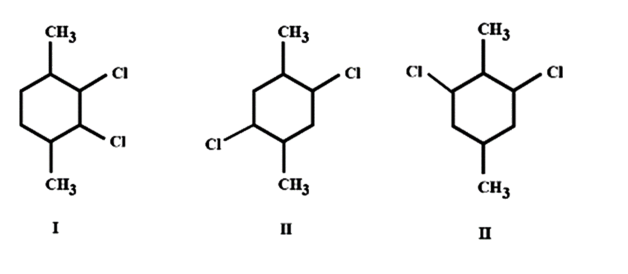Which of the following solution will have highest boiling point ?
0.1 M urea ()
To determine which solution will have the highest boiling point, we can use the concept of colligative properties, specifically the elevation in boiling point (ΔTb). The formula for ΔTb is given by:
ΔTb=i⋅Kb⋅m
Where:
- ΔTb = elevation in boiling point
- i = van 't Hoff factor (number of particles the solute dissociates into)
- Kb = ebullioscopic constant (a constant specific to the solvent)
- m = molality of the solution
1. Identify the van 't Hoff factor (i) for each solute:
- FeCl3: Dissociates into Fe3+ and 3Cl−. Thus, i=1+3=4.
- BaCl2: Dissociates into Ba2+ and 2Cl−. Thus, i=1+2=3.
- NaCl: Dissociates into Na+ and Cl−. Thus, i=1+1=2.
- Urea: Does not dissociate (non-electrolyte). Thus, i=1.
2. Calculate the elevation in boiling point (ΔTb) for each solution using the given molality (0.1 molal):
- For FeCl3:
ΔTb=i⋅Kb⋅m=4⋅1.86⋅0.1=0.744
- For BaCl2:
ΔTb=3⋅1.86⋅0.1=0.558
- For NaCl:
ΔTb=2⋅1.86⋅0.1=0.372
- For Urea:
ΔTb=1⋅1.86⋅0.1=0.186
3. Compare the calculated ΔTb values:
- FeCl3: 0.744
- BaCl2: 0.558
- NaCl: 0.372
- Urea: 0.186
4. Determine the highest boiling point:
The solution with the highest ΔTb will have the highest boiling point. From our calculations, FeCl3 has the highest ΔTb value of 0.744.
Conclusion:
The solution with the highest boiling point is 0.1 molar FeCl3.
- ΔTb = elevation in boiling point
- i = van 't Hoff factor (number of particles the solute dissociates into)
- Kb = ebullioscopic constant (a constant specific to the solvent)
- m = molality of the solution
- FeCl3: Dissociates into Fe3+ and 3Cl−. Thus, i=1+3=4.
- BaCl2: Dissociates into Ba2+ and 2Cl−. Thus, i=1+2=3.
- NaCl: Dissociates into Na+ and Cl−. Thus, i=1+1=2.
- Urea: Does not dissociate (non-electrolyte). Thus, i=1.
- For FeCl3:
ΔTb=i⋅Kb⋅m=4⋅1.86⋅0.1=0.744
- For BaCl2:
ΔTb=3⋅1.86⋅0.1=0.558
- For NaCl:
ΔTb=2⋅1.86⋅0.1=0.372
- For Urea:
ΔTb=1⋅1.86⋅0.1=0.186
- FeCl3: 0.744
- BaCl2: 0.558
- NaCl: 0.372
- Urea: 0.186
The solution with the highest ΔTb will have the highest boiling point. From our calculations, FeCl3 has the highest ΔTb value of 0.744.
The solution with the highest boiling point is 0.1 molar FeCl3.
Topper's Solved these Questions
- THEORY OF SOLUTIONSBook:VMC MODULES ENGLISHChapter:THEORY OF SOLUTIONSExercise:LEVEL 2
Explore 65 Videos
- THEORY OF SOLUTIONSBook:VMC MODULES ENGLISHChapter:THEORY OF SOLUTIONSExercise:JEE Main (Archive)
Explore 57 Videos
- THEORY OF SOLUTIONSBook:VMC MODULES ENGLISHChapter:THEORY OF SOLUTIONSExercise:JEE Advanced (Archive)
Explore 31 Videos
- THE SOLID STATEBook:VMC MODULES ENGLISHChapter:THE SOLID STATEExercise:EXERCISE-J
Explore 10 Videos
- THERMOCHEMISTRYBook:VMC MODULES ENGLISHChapter:THERMOCHEMISTRYExercise:JEE ADVANCED (ARCHIVE)
Explore 31 Videos
Similar Questions
Knowledge Check
Which of the following compounds will have highest melting point?
AChlorobenzeneBo-DichlorobenzeneCm-DichlorobenzeneDp-Dichlorobenzene
Which of the following solution have highest boiling point. (Assume all salts completely dissociates)
View SolutionWhich of the following solutions will exhibit highest boiling point?
View SolutionWhich of the following solutions has highest bolling point?
View SolutionWhich of the following compounds will have highest melting point ?

View SolutionWhich of the following will have the highest boiling point at 1atm pressure?
View SolutionWhich of the following solution will have highest specific conductance?
View SolutionWhich of the following solutions has the highest pH?
View Solution